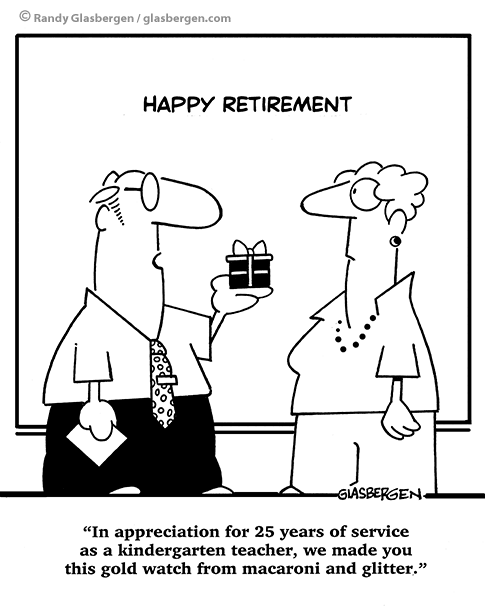

Let’s be honest with our teachers
School is almost out for the year and our kids are looking forward to a break. If I was a teacher I would be looking forward to the break too. It can’t be easy managing a room full of kids these days. In my day paying attention was hard – now with a smart phone in the hand of every student it is even harder to get the attention of a teenager.
For some teachers, this will be the end of the line. Retirement will be upon them. In Ontario, the magic number is 85. When a teacher’s age and service add up to 85, they can take their pension without reduction. This means that if you start teaching at 25, then at age 55 you are out the door after spending 30 years molding the minds of our future leaders. When I first worked on the Teacher’s pension plan in 1986 it was 90 points but in the late 1990s it was moved to 85 points just as interest rates were falling and the tech bust of the early 2000s fell upon us.
Some teachers stay a few years longer since every additional year is an extra year of pay and it is also a boost to the monthly pension until you reach 35 years. But it appears that most teachers leave shortly after they qualify for the 85 points. I have long been bothered by this super-generous provision of the pension plan and I have always worried that we were headed to a crisis as more and more teachers decide to walk out as soon as they can.
With grade 12 graduation for our oldest tomorrow, I started thinking about the Teacher’s pension plan again and started digging into the publicly available information to see what I could learn. Not satisfied with my inability to find the smoking gun, I talked to three super-smart actuaries that know more about the plan than most of us. In the end, there is no smoking gun. Everything adds up, the plan is well run and doing the homework has been a fascinating investigation for me. The folks running the plan understand the risks that they are taking and they are doing a good job of disclosing them. To be clear, as time passes, the plan is taking bigger and bigger risks because safe investments are harder to find these days. I sometimes wish I had taken the career path that leads to the incredibly interesting role of Chief Investment Risk Officer at the Teachers’ pension plan; but then I remember I am probably not smart enough and I am definitely not politically savvy enough.
So, having done the homework, what can I tell you that you might not have known? I have been worried that the plan will pit teachers against taxpayers when the investments don’t pan out. It turns out that this is only half true. Taxpayers pay for 50% of the pension plan, teachers the other half. So, it turns out that the plan will pit younger retirees with more working years after 2009 against those who managed to retire in an earlier time.
Without overdoing the math, the nuts and the bolts of it is that today’s teachers are paying more than teachers in the 1990s for a pension that might not be indexed if the investment returns needed aren’t realized. Worse, first call on investment returns are the older retirees. If you are just starting to teach now the investments first must satisfy the 100% CPI indexed promises from pre-2009 before you can get any indexing. As the years pass, this ‘conditional indexing’ will make the plan more and more resilient to investment mediocrity by only providing this new generation of teachers what the plan can afford. As a taxpayer, I feel a whole lot better. I would feel even better if we could completely isolate the cost borne by taxpayers and put 100% of the risks back on plan members. This is what happens with many trade union pension plans. Unfortunately, I am not expecting any government to have the political will to make that change happen for our teachers.
This investigation leads to peripheral questions about how we select teachers, how much we pay teachers and whether working for 25 to 30 years and retiring before age 60 is an outcome the taxpayers think is fair for the services that we receive. The Canadian Institute of Actuaries is working on a study of retirement ages and looking at whether age 65 should still be the ‘normal retirement age’ in Canada or if it should move later to an age such as 67– no one that I know of is advocating that retirement move the other direction towards age 60.
There is more interesting discussion ahead on this subject.




Comments
2